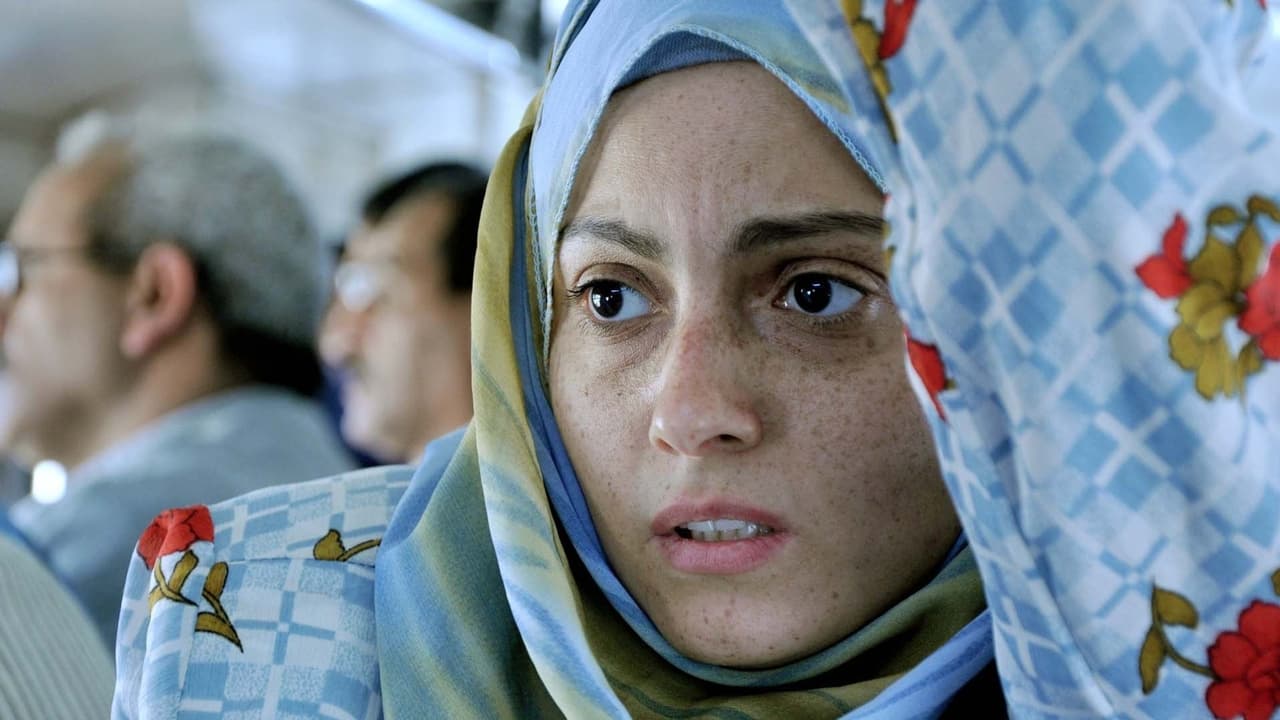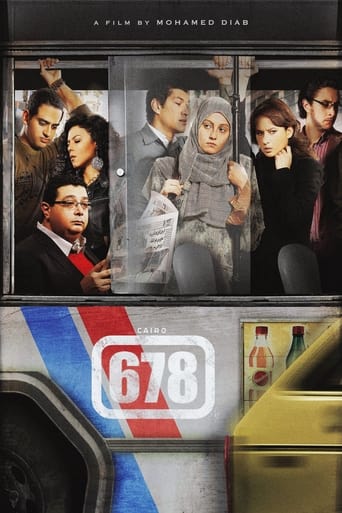



the leading man is my tpye
Best movie of this year hands down!
A Masterpiece!
.Like the great film, it's made with a great deal of visible affection both in front of and behind the camera.
View MoreCairo 678 is a story of three women of different social background who found themselves victimized of sexual harassment. The movie is important because it talks about sexual harassment in a country like Egypt and thus depicts that sexual harassment does exist in the countries that claim to be conservative.The strongest point of the movie is it never loses its momentum. Not a single moment you will feel that the story is being pulled. The screenplay runs in full flow. The fantastic work of light/shadow and enchanting background music make it even more attractive.Everyone acted in this film did justice to their characters. Bosra (who played Fayza) and Maged El Kedwany won the awards for best actress and actor respectably in 2008 Dubai International Film Festival. I personally liked the acting of Nahed El Sebai (who played Nelly) most. She had a comparatively smaller screen presence yet she delivered an excellent performance.This movie is not only about Cairo, it is about every city and village where women are facing sexual harassment everyday. This movie does not promote violent reaction against harassment, it tells us to speak up against what is wrong. Kudos to Mohamed Diab and the whole unit of 678 for this masterpiece.
View MoreCAIRO 6,7,8:Mohamed Diab, the director should be congratulated for this gripping presentation of the silent humiliation suffered by Egyptian women and the courage of three women in fighting back against all odds. If Fayza's simple step brings he system to the point of examining its flaws, Seba and Nelly garner the much needed support to provide a platform for the voice of the suffering women. The sound track is excellent and the editing is superb, providing the best support to the clear and commendable cinematography. All the characters have acted so well, it looks as if it is happening in our presence. One of the best films destined to change the perspective of the society in the way it allows such gross injustice to go unpunished. The end is dramatic and deeply touching, adding a feather in the director's cap.
View MoreThe Egyptian movie, [678], which covers the subject of sexual harassment, is famous enough in Egypt today as it is. I must admit, from watching just the trailer, I took note of the genius performance and superb artistic delivery, but I also got the impression that the presentation may be overdramatizing the subject, or emotionally taking the side of women in a biased & exaggerated way, or completely ignoring the effect of the sometimes sexually provocative presentation of women when it happens in a society like the Egyptian one—this impression couldn't be more wrong. What I found while watching the movie was one of the most heartwarming and pleasant surprises I've ever come across in the history of Egyptian cinema; no exaggeration, my friend. 678 draws you into a fascinatingly complex, interconnected, and rich world. 678 allows you to meet—and literally live with—such fresh, yet believable characters. 678 turns your head toward a bitter reality, in a harsh real world, yet soothes you with regular chuckles, and keeps you interested, bothered, engaged, and hopeful. Every main cast member did a great job in my opinion, but I must say that Bushra clearly stands out; and I'm don't want to disappoint—or be unfair to—other cast members, especially Nelly Kareem with a main character, by saying that this is only due to Bushra's genius performance; Bushra's performance was indeed fascinating, but she was also very lucky, because the other genius, Muhammad Diab, the writer and director of 678, gave Bushra his best character! Faiza, the character that Bushra plays, like a sad yet powerful tune in a beautiful song, is an unprecedented character in Egyptian cinema; and I wouldn't be exaggerating if I said that Faiza may revolutionize Egyptian cinema, or be the spark of such a creative, artistic revolution, where the voice of the observant Muslim for the first time ever gets delivered honestly, neutrally, fairly, and in a balanced and beautiful way. Faiza is one of the most believable characters I've ever gotten to know in a story, and easily my favorite hero in 678's world; and I thank the two geniuses, Muhammad Diab and Bushra, for giving us and giving Egyptian cinema—and the world—such a memorable, lovable, and very real character.Diab managed to turn Faiza into an irresistibly charming, unlikely hero (or heroine!), with all her ups & downs, good deeds & mistakes, kindness & anger, loudness & silence, courage & fear; simply put, Faiza is so perfectly imperfect. Even her arguments with her husband were believable and convincing—within the context of the Egyptian society and that social class; and Diab did not take sides, and did not try to emotionally blackmail you into taking sides either. In many situations, Diab makes you wonder who to blame—if you are a balanced person yourself and you can empathize with the culture, religion and challenges; makes it challenging for you to be biased, and thus subtly invites you to appreciate the complexity and individual challenges in this realistic world. The only truly "bad guy" in 678 is the sexual harasser; Diab's message is clear about this, especially because he shows you the far reaching effects and chain reaction that the harasser's actions go through to eventually produce so much misery and evil within society; but Diab also makes at least one subtle hint to discourage you from completely demonizing the harasser, and to send the message that almost any human being is fallible. Diab also doesn't shy away from shocking you (and his best character, Faiza!) by giving a minority of women a share of the blame; while empowering all women throughout the movie to take a courageous share of the responsibility of curing society of the phenomenon of sexual harassment.If you will watch one movie to understand a bit about the Egyptian society—as it is today, without exaggerations or embellishment, in ways that focus on the phenomenon of sexual harassment, yet still ooze with variety, and ways that dig much deeper and beyond socially and emotionally; if you will watch one movie to see a believable example of a simple observant Muslim woman, struggling with real issues in her own society, a movie that doesn't even expose any actress (or your eyes) to violence, rape, or the likes, while simultaneously making what is happening clear to you with such elegance and genius; if you will watch one foreign movie that does not take sides when it comes to religion or gender, makes it challenging for you to take sides when you see how these people think and treat each other, a movie that tackles serious issues rationally and intelligently; then this one movie is 678. Find it; and watch it! Watch it this weekend.—Yaseen Rocca
View MoreHaving incorrectly and vaguely labelled 'Cairo 678' a 'feminist movie', I was pleasantly surprised to have all my misconceptions quashed in such a subtle and articulate manner. Yes, Cairo 678 is a film about 'women's plight' in Egypt but also an important commentary on the class structure inherent in most societies but particularly stark in Cairo where gleaming BMWs travel alongside over-heated, bursting buses where sexual harassment is inevitably common place, as depicted in the film. Feyza is a working-class mother struggling to pay her children's school fees and to fend off her husband's sexual advances. It soon becomes apparent that her tardiness to work is simply a result of her desperate attempts to avoid the over-crowded buses where she is routinely molested by over-eager male passengers. She soon befriends Seba, a wealthy self- defence teacher whom we learn was raped a year earlier, as well as a middle class student (Nelly) whose life-threatening assault results in a historic first legal case for sexual harassment in Egypt.What binds these women together is a frustration at the unashamed impunity to these men's actions and society's pretend ignorance about their daily struggle to walk down Cairo's streets without harassment. However, the film also points to a greater problem inherent in Egypt's societal structure where the struggle to attain money, power and status take precedence over morality and the fostering of positive and fulfilling life plans and relationships. Nelly is encouraged to drop her court case by her family to protect her reputation, Seba is advised not to report the rape by her mother to preserve her powerful father's reputation and Feyza is forced to continue taking the bus to salvage enough money to pay her children's school fees. All three women appreciate the farcical nature of the attitudes they are subjected to, yet the barriers to mounting a justified response emotionally or in action seem insurmountable. A common thread explored in the film is the hippocracy and confusion regarding the issue of sexual harassment which is a relevant issue in both traditional and 'westernised' cultures. Should women shoulder the blame if they are a victim of harassment, and if not, why does guilt and shame always play such a large role in the aftermath? A survey conducted by Haven, a sexual assault centre found that more than half of women thought that rape victims are sometimes to blame for the crime. So, it seems that the fight to reconfigure perceptions of sexual harassment and assault extend to both women and men, an issue painfully and clearly demonstrated in Cairo 678 when Seba questions Reyza's lack of guilt after she secretly starts stabbing the men who molest her in retaliation. Reyza responds by explaining that she conducts herself modestly and covers her hair so she has no reason to feel guilty, unlike Seba who leaves her hair loosely flowing and wears tight clothes and so is in some way to blame for any unwanted advances. The impact of these frustrations and violations extends to the women's intimate relationships with the men in their lives. To Reyza, Seba and Nelly, it seems that the men in their lives are just as guilty of the rampant sexualisation of the predators and the hippocracy of society as a whole and it seems that at times they find it impossible to differentiate between the two. The director effectively demonstrates how the daily grind of constantly being on guard and dealing with eroticisation wears the women down and creates a dichotomy in which the women struggle with the desire for revenge and justice, coupled with the pressure to conform to social expectations. However, the strength and originality of the film's vision lies in it's willingness to give the balanced view where men are not wholly villainised; that would be far too easy. Men's exposure to a new-found culture of open sexualisation of women and the mirage of availability is sensitively portrayed, in conjunction with the financial barriers to marriage. The idea of marriage being a cultural protective factor for the male population with regards to sexual harassment and 'deviance' is also challenged with an unexpected twist to the plot.In all, Cairo 678 wonderfully depicts a society in which sexual assault and harassment divide opinion and attitude in both public and personal life, more than simply down the lines of gender. As societies struggle with the changing and more proactive role of women in daily life along with evolving imagery involving female sexuality and availability, an open and dynamic forum is required to challenge long-standing and held deeply beliefs about blame, stigma and shame. Feyza, Reza and Nelly's experiences convincingly and emotively demonstrate the painful and costly consequences of avoiding such discussion.
View More